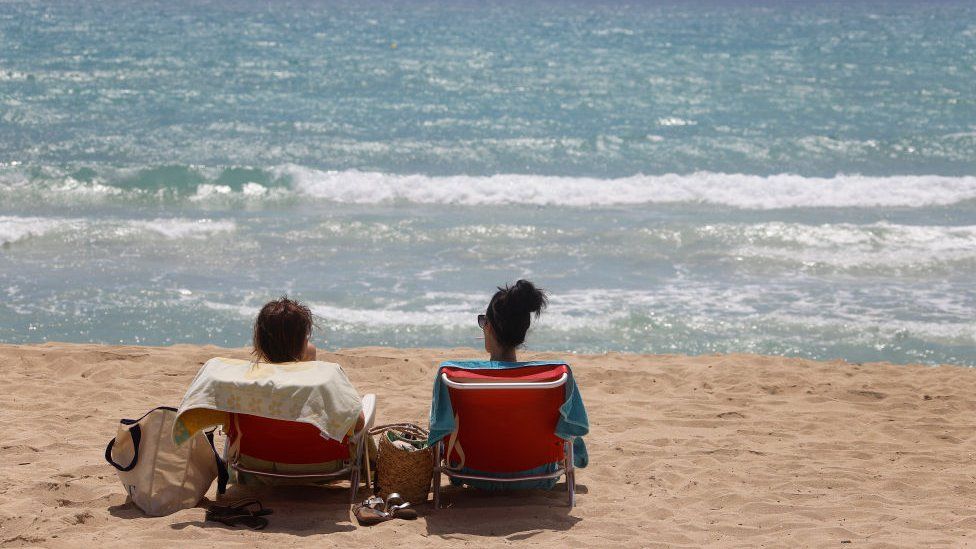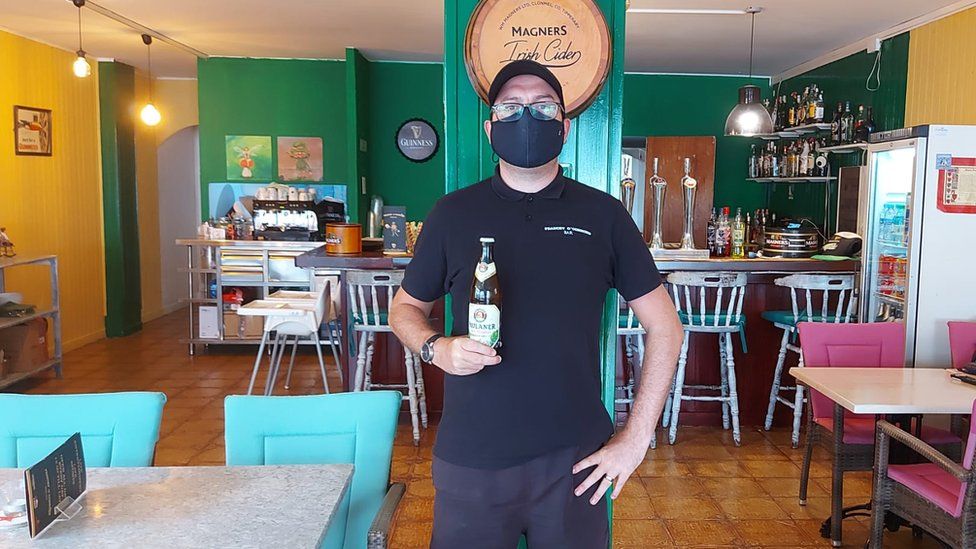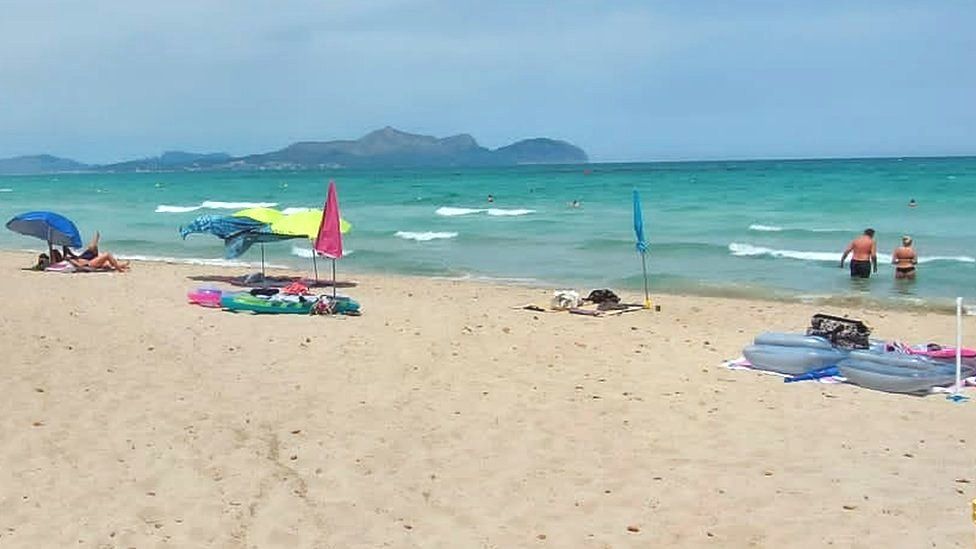THE UK TRAVEL INDUSTRY ANGERED OVER GERMAN TOURISTS’ FREEDOM

The bosses of Jet2, Easyjet and Manchester Airport have criticised the government for not putting the Balearic Islands, including Majorca, on the green travel list.
The boss of Jet2 said he was “bewildered” over why they couldn’t fly to those destinations.
While UK travel is limited, Germans are flocking to popular holiday spots.
The government said it would continue to explore how to open international travel safely.
Currently very few countries are on the government’s green list, which means they are approved for leisure travel, requiring less testing and no quarantine on return.
“When you take the UK government’s own criteria for deciding where holidaymakers can travel to, and apply it to the Balearics, we are left bewildered as to why we cannot fly there,” said Jet2 and Jet2 Holidays’ chief executive Steve Heapy.
Charlie Cornish, chief executive of Manchester Airport Group (MAG) said EU countries were taking a more positive approach to resuming international travel.
“Hundreds of thousands of people from places like Germany are travelling freely and safely to low-risk holiday destinations,” he said.
MAG has joined with low cost airline Ryanair to launch a legal action against the government over its traffic light system, particularly focusing on the lack of transparency over how countries are classified.
The Spanish island of Majorca, a favourite of British tourists for decades, is currently on the amber list; travel there is not advised and quarantine is required on return to the UK.
But rates of the virus are lower there than in the UK and in recent weeks, German tourists have started arriving in Majorca in large numbers. German travellers need just a digital pre-registration and either an antigen test or proof of vaccination.
Palma de Majorca Airport confirmed to the BBC that during May, 397,931 tourists arrived from Germany on 3,363 flights. In contrast 5,813 UK tourists arrived on 333 flights from UK airports.
Local businesses in the Balearics that usually rely on British tourists and their holiday spending, are feeling their absence for a second summer.
Mark Steenson owns Francey O’Connor’s, an Irish pub in Ca’n Picafort, a Majorca resort that usually welcomes thousands of British holiday-makers.
But with Brits still advised not to travel there, he has begun to gear his trade to those who can.
“I went and got a Borussia Dortmund shirt and had the bar sign redone in German to get the German football fans in,” said Mr Steenson.
“If it weren’t for the Germans, we’d be broke. Ca’n Picafort is rammed with Germans,” he said. “It is a joy to see.”

But rapid adjustments have had to be made, he says: “I’ve gone out and bought German beers and I’ve started trying to learn some German words so I can chat to them.”
The Germany and France game in the Euro 2020 tournament earlier this week was a big pull and for the first time this summer, the terrace at Francey O’Connor’s filled up.
But while German visitors are a lifeline for Mark Steenson, the absence of their British counterparts has angered Manchester Airport Group boss, Charlie Cornish.
The UK’s current traffic light system had not recognised the progress many countries have made in reducing rates of the virus, he said.
“The government’s lack of transparency is unacceptable and makes operating a business in the travel sector almost impossible after what has already been the most challenging year in our history.”
Epidemiologists worry that mass travel before more people are fully vaccinated, both in the UK and at holiday destinations, will allow the virus to spread more rapidly. And if Covid cases spiral suddenly on holiday islands, it is not clear if healthcare systems there are in a position to manage their care.
Added to this, there are now concerns amongst EU nations about the Delta variant now dominant in the UK. The EU has not added the UK to its “white list” permitting travel. But this list is only guidance and EU nations can make their own decisions.
That’s not a pressing issue for most EU governments yet, with the UK’s largest tour operators almost completely grounded.

But when UK tourists are eventually allowed to travel again, the delays may put them at a price disadvantage, according to Julia Lo Bue-Said, chief executive of the Advantage Travel Partnership.
“We are closed for businesses, we really are,” she said. “Our counterparts in Germany and Europe are flocking to the Med.
“What that will mean is a reduction in product for when we restart, and access to uncompetitive pricing, because everyone else will have picked best rates.”
“As an industry it demonstrates that you can’t plan an operation at the last minute. But there is no comprehension in government of the complexity of this story.”
Earlier this week, Easyjet announced it was increasing capacity from Germany to Majorca, to cope with swelling holiday demand.
“We’ve just recently added 150,000 seats from Berlin into Palma to try meet the huge pent-up demand that has been released from those restrictions lifting,” said Garry Wilson, chief executive of easyJet Holidays.
“It is a shame we can’t do the same for UK customers, because we know demand is there.”
A Department for Transport spokesperson said: “Our first priority is protecting the public and saving lives, and the traffic light system we have in place categorises countries and territories based on risk, using the latest data.
“As set out in the Global Travel Taskforce, we continue to engage with international partners to explore how we can open international travel safely.”

Steve Heapy, boss of Jet2 said the continued exclusion of UK tourists risked inflicting long-term damage on the travel industry.
“Other nationalities are going, German customers are arriving on jumbo jets that are being put into Majorca and hotels are filling up.
“Hotels will give rooms in the future to these other nationalities and British tour operators and customers could be squeezed out.
He said he hoped the government would review its decision after reexamining the data on 24 June.
“If that is the case, and Malta, Balearic and Canary Islands continue to have low infection rates, I expect them to be on the list. If they are not – I expect an explanation. “



